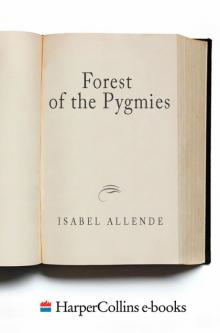- Home
- Isabel Allende
The Stories of Eva Luna Page 5
The Stories of Eva Luna Read online
Page 5
The large headquarters of Sheepbreeders, Ltd., rose up from the sterile plain like a forgotten cake; it was surrounded by an absurd lawn and defended against the depredations of the climate by the superintendent’s wife, who could not resign herself to life outside the heart of the British Empire and continued to dress for solitary dinners with her husband, a phlegmatic gentleman buried beneath his pride in obsolete traditions. The native Spanish-speaking drovers lived in the camp barracks, separated from their English patrones by fences of thorny shrubs and wild roses planted in a vain attempt to limit the immensity of the pampas and create for the foreigners the illusion of a gentle English countryside.
Under surveillance of the management’s guards, aching with cold without so much as a bowl of hot soup for months, the workers survived in misery, as neglected as the sheep they herded. In the evening, there was always someone who would pick up the guitar and fill the air with sentimental songs. They were so impoverished for love that despite the saltpeter the cook sprinkled over their food to cool their bodily ardor and the fires of memory the drovers lay with their sheep, even with a seal if they could get to the coast and catch one. The seals had large mammae, like a nursing mother’s, and if they skinned the still living, warm, palpitating seal, a love-starved man could close his eyes and imagine he was embracing a siren. Even with such obstacles, the workers enjoyed themselves more than their employers, thanks to Hermelinda’s illicit games.
Hermelinda was the only young woman in all the land—aside from the English lady who crossed through the rose fence with her shotgun only when in search of hares; even then, all the men could glimpse was a bit of veiled hat amid a cloud of dust and yelping English setters. Hermelinda, in contrast, was a female they could see and count on, one with a heady mixture of blood in her veins and a hearty taste for a good time. She was in the business of solace out of pure and simple vocation; she liked almost all the men in general, and many in particular. She reigned among them like a queen bee. She loved their smell of work and desire, their harsh voices, their unshaven cheeks, their bodies, so vigorous and at the same time so pliable in her hands, their pugnacious natures and naïve hearts. She knew the illusory strength and extreme vulnerability of her clients, but she never took advantage of those weaknesses; on the contrary, she was moved by both. Her rambunctious nature was tempered by traces of maternal tenderness, and night often found her sewing patches on a shirt, stewing a chicken for some sick drover, or writing love letters for distant sweethearts. She made her fortune on a mattress stuffed with raw wool under a leaky zinc roof that moaned like lutes and oboes when the wind blew. Hermelinda’s flesh was firm and her skin unblemished; she laughed with gusto and had grit to spare, far more than any terrified ewe or flayed seal could offer. In every embrace, however brief, she proved herself an enthusiastic and playful friend. Word of her firm horsewoman’s legs and breasts without a trace of wear had spread across the six hundred kilometers of that wild province, and lovers traveled many miles to spend a while in her company. On Fridays, riders galloped frantically from such far reaches that as they arrived their foaming mounts dropped beneath them. The English patrones had outlawed the consumption of alcohol, but Hermelinda had found a way to distill a bootleg liquor that raised the spirits and ruined the liver of her guests. It also served to fuel the lamps at the hour of the entertainment. Bets began after the third round of drinks, when it was impossible for the men to focus their eyes or sharpen their wits.
Hermelinda had conceived a plan to turn a sure profit without cheating anyone. In addition to cards and dice, the men could try their hand at a number of games in which the prize was her person. The losers handed over their money to her, as did those who won, but the winners gained the right to dally briefly in her company, without pretext or preliminary—not because she was unwilling but because she lacked time to give each man special attention. The players in Blind Rooster removed their trousers but kept on their jackets, caps, and sheepskin-lined boots as protection against the antarctic cold whistling through the floorboards. Hermelinda blindfolded them and the chase began. At times they raised such a ruckus that their huffing and guffaws spread through the night beyond the roses to the ears of the impassive English couple who sat sipping a last cup of Ceylon tea before bed, pretending they heard nothing but the caprice of the wind across the pampas. The first man to lay a hand on Hermelinda blessed his good fortune as he trapped her in his arms and crowed a triumphant cock-a-doodle-doo. Swing was another of the games. Hermelinda would sit on a plank strung from the roof. Laughing before the men’s hungry gazes, she would flex her legs so all could see she had nothing on beneath the yellow petticoats. The players, in an orderly line, had a single chance to possess her, and anyone who succeeded found himself clasped between the beauty’s thighs, swept off his feet in a whirl of petticoats, rocked to his bone marrow, and lifted toward the sky. Very few reached the goal; most rolled to the floor amid the hoots of their companions.
A man could lose a month’s pay in fifteen minutes playing the game of Toad’s Mouth. Hermelinda would draw a chalk line on the floor and four steps away draw a large circle in which she lay down on her back, knees spread wide, legs golden in the light of the spirit lamps. The dark center of her body would be revealed as open as a fruit, as a merry toad’s mouth, while the air in the room grew heavy and hot. The players took a position behind the chalk line and tossed their coins toward the target. Some were expert marksmen, with a hand so steady they could stop a panicked animal running at full speed by slinging two stone bolas between its legs, but Hermelinda had an evasive way of sliding her body, shifting it so that at the last instant the coin missed its mark. Those that landed inside the chalk circle belonged to her. If one chanced to enter the gate of heaven, it won for its owner a sultan’s treasure: two hours alone with her behind the curtain in absolute ecstasy, seeking consolation for all past wants and dreams of the pleasures of paradise. They told, the men who had lived those two precious hours, that Hermelinda knew ancient love secrets and could lead a man to the threshold of death and bring him back transformed into a wise man.
Until the day that an Asturian named Pablo appeared, very few had won that pair of wondrous hours, although several had enjoyed similar pleasure—but for half their salary, not a few coins. By then Hermelinda had accumulated a small fortune, but the idea of retiring to a more conventional life had never occurred to her; in fact, she took great pleasure in her work and was proud of the sparks of pleasure she afforded the drovers. This Pablo was a lean man with the bones of a bird and hands of a child, whose physical appearance contradicted his tremendous tenacity. Beside the opulent and jovial Hermelinda he looked like a peevish banty rooster, but anyone who thought he could enjoy a good laugh at El Asturiano’s expense was in for a disagreeable surprise. The tiny foreigner tensed like a viper at the first provocation, ready to lash out at anyone who stood in his way, but the row was always settled before it began because Hermelinda’s first rule was that no one fought beneath her roof. Once his dignity had been established, Pablo relaxed. He had a determined, rather funereal, expression; he spoke very little and when he did he revealed his European origins. He had left Spain one jump ahead of the police, and he earned his daily bread running contraband through the narrow Andean passes. He was known to be a surly, pugnacious loner who ridiculed the weather, the sheep, and the English. He had no fixed home and he admitted to no loves or obligations, but he was not getting any younger and solitude was seeping into his bones. Sometimes when he awoke at dawn on the icy ground, wrapped in his black Castilian cape and with his saddle for a pillow, every inch of his body ached. The pain was not the pain of stiff muscles but an accumulation of sorrow and neglect. He was tired of living like a lone wolf, but neither was he cut out for domestication. He had come south because he had heard the rumor that at the end of the world there was a woman who could change the way the wind blew, and he wanted to see her with his own eyes. The vast distance and the risks of the road
had not dampened his determination, and when finally he found Hermelinda’s saloon and had her in arm’s reach, he could see she was forged of the same hard metal as he, and he decided that after such a long journey life would not be worth living without her. He settled into a corner of the room to study her and calculate his possibilities.
El Asturiano had guts of steel; even after several glasses of Hermelinda’s liquor his eyes were still clear. He refused to remove his clothes for St. Michael’s Patrol, or Mandandirun-dirun-dan, or other contests he found frankly infantile, but toward the end of the evening, when it was time for the crowning moment—The Toad—he shook off the fumes of the alcohol and joined the chorus of men around the chalk circle. To him, Hermelinda was as beautiful and wild as a puma. He felt the stirrings of his hunter’s instinct, and the undefined pain of the alienation that had tormented him during his journey turned to tingling anticipation. He saw the feet shod in low boots, the woven stockings rolled below the knee, the long bones and tense muscles of those legs of gold in the froth of full petticoats, and he knew that he would have but one opportunity to win. He took his position, planting his feet on the floor and rocking back and forth until he found the true axis of his being; he transfixed Hermelinda with a knifelike gaze, forcing her to abandon her contortionist’s tricks. Or that may not have been how it was; it may be that she chose him from among the others to honor with her company. Pablo squinted, exhaled a deep breath, and after a second or two of absolute concentration, tossed his coin. Everyone watched as it formed a perfect arc and entered cleanly in the slot. A salvo of applause and envious whistles celebrated the feat. Nonchalantly, the smuggler hitched up his pants, took three steps forward, seized Hermelinda’s hand and pulled her to her feet, prepared to prove in his two hours that she could not do without him. He almost dragged her from the room; the men stood around drinking and checking their watches until the period of the reward had passed, but neither Hermelinda nor the foreigner appeared. Three hours went by, four, the whole night; morning dawned and the bells rang for work, and still the door did not open.
At noon the lovers emerged. Pablo, without a glance for anyone, went outside to saddle his horse, a horse for Hermelinda, and a mule to carry their belongings. Hermelinda was wearing riding pants and jacket, and a canvas bag filled with coins was tied to her waist. There was a new expression in her eyes and a satisfied swish to her memorable rump. Solemnly, they strapped their goods onto the mule, mounted their horses, and set off. Hermelinda made a vague wave of farewell to her desolate admirers, and followed El Asturiano across the barren plains without a backward glance. She never returned.
The dismay occasioned by Hermelinda’s departure was so great that to divert the workmen the management of Sheepbreeders, Ltd., installed swings, bought a target for darts and arrows, and had an enormous open-mouthed ceramic toad imported from London so the drovers could refine their skill in coin tossing, but before a general indifference, those toys ended up on the superintendent’s terrace, where as dusk falls the English still play with them to combat their boredom.
THE GOLD OF TOMÁS VARGAS
Before the monumental pandemonium of progress, anyone who had any savings buried them. That was the only way people knew to safeguard their money; it was only later they learned to have confidence in banks. Once the highway came through and it became easier to reach the town by bus, people exchanged their gold and silver coins for colored pieces of paper they kept in strongboxes, as if they were treasure. Tomás Vargas ridiculed these innocents because he never trusted the bank system. Time proved him right, and after the government of El Benefactor fell—it lasted some thirty years, they say—the bills had no value and many people ended up pasting them on the wall for decoration as an unpleasant reminder of their naïveté. While everyone else was writing letters to the new President and the newspapers were complaining of the general unworthiness of the new money, Tomás Vargas’s gold nuggets were buried in a safe hiding place, although his good fortune did nothing to mitigate his miserliness or his scrounging. The man had no decency; he borrowed money with no intention of paying it back, and his children went hungry and his wife wore rags while he wore Panama hats and smoked expensive cigars. He even refused to pay the fees for his children’s schooling; his six legitimate children were educated free, because the schoolteacher Inés was determined that as long as she had her wits about her and strength enough to work no child in her town would go without learning to read. Age did nothing to quell Vargas’s bent for quarreling, carousing, and womanizing. He took great pride in being the most macho macho in the region, as he bellowed in the plaza every time he went off his head with drink and broadcast at the top of his lungs the names of all the girls he had seduced and all the bastards who carried his blood. If he were to be believed, he had sired at least three hundred, for with every fit he spouted different names. The police carried him off more than once, and the Lieutenant himself had given him a few well-placed kicks in the behind, hoping that would improve his character, but the Lieutenant’s ministrations had no more effect than the priest’s admonitions. In fact, the only person Vargas respected was Riad Halabí, the storekeeper. That is why the neighbors came to him when they suspected that Vargas was drunk and out of control, and was beating his wife or his children. When that happened, the Turk left his counter so fast he forgot to close the shop but raced, choked with righteous wrath, to set things right in the Vargas household. He never needed to say much; the minute Vargas saw him, he calmed down. Riad Halabí was the only person capable of shaming the brute.
Antonia Sierra, Vargas’s wife, was twenty-six years younger than he. But she was an old woman by the time she was forty: she had hardly a tooth left in her head, and her once-audacious body had been ruined by work, births, and miscarriages; even so, she still displayed a trace of her past arrogance, a way of walking with her head held high and her body arched—an aftertaste of her old mulatto beauty—and a ferocious pride that arrested any overture of pity. For Antonia, there were not enough hours in the day, because besides caring for her children and looking after the garden and the hens, she earned a few pesos by cooking lunch for the police, taking in washing, and cleaning the school. There were times that her body was covered with black-and-blue marks; no one had to ask, all Agua Santa knew about the abuse she took from her husband. Only Riad Halabí and the schoolteacher Inés dared to give her something now and then, thinking up excuses to keep from offending her—a few clothes, a little food, notebooks and vitamins for the children.
Antonia had to put up with a lot from her husband, including his bringing his concubine into her house.
* * *
Concha Díaz arrived in Agua Santa on one of the National Petroleum trucks, as sad and mournful as a ghost. The driver had taken pity on her when he saw her walking barefoot down the road with one bundle over her shoulder and another in her belly. All the trucks stopped when they drove through town, so Riad Halabí was the first to hear the story. He saw the girl appear in his doorway, and by the way she plopped down her bundle before the counter, he immediately realized that she was not passing through; this girl had come to stay. She was very young, dark-skinned, and short, with a thick mop of sun-streaked curly hair that seemed not to have seen a comb for some time. As he always did with visitors, Riad Halabí offered Concha a chair and a cool pineapple drink, and prepared to listen to the account of her adventures or misfortunes. This girl, however, said very little; she just blew her nose with her fingers and kept her eyes on the floor, mumbling a string of laments as tears slowly trickled down her cheeks. Finally the Turk made out that she wanted to see Tomás Vargas, and he sent someone to fetch him from the tavern. He waited in the doorway, and as soon as he saw Vargas, he grabbed the old man by the arm and led him before the girl, not giving him time to recover from his fright.
“The girl says this is your baby,” said Riad Halabí, in the mild tones he used when he was angry.
“No one can prove it, Turk.
You always know who the mother is, but you can’t be sure about the father,” said Vargas, discomfited, but with still enough gall to try a raffish wink, which no one appreciated.
With that, the girl raised the pitch of her weeping, gulping out that she would never have come all this way if she hadn’t known who the father was. Riad Halabí told Vargas that he should be ashamed, that he was old enough to be the girl’s grandfather, and if he thought that people were going to forgive him his sins this time, he was mistaken, what could he have been thinking, but when the girl wailed even louder, he said what everyone knew he would say.
“There, there, child. It’s all right. You can stay here in my house for a while, at least until the baby’s born.”
Concha Díaz began to sob even more wildly, and declared that she would not live anywhere except with Tomás Vargas; that was why she had come. The air congealed in the store; there was a long silence punctuated only by the sound of the ceiling fans and the woman’s snuffling. No one had the nerve to tell the girl that the old man was married and had six children. Finally, Vargas picked up the girl’s bundle and pulled her to her feet.
“All right, Conchita, if that’s what you want, that’s what it’ll be. We’ll go to my house right this minute.”

 The Stories of Eva Luna
The Stories of Eva Luna The House of the Spirits
The House of the Spirits Paula
Paula Ines of My Soul
Ines of My Soul Of Love and Shadows
Of Love and Shadows Kingdom of the Golden Dragon
Kingdom of the Golden Dragon Daughter of Fortune
Daughter of Fortune City of the Beasts
City of the Beasts Maya's Notebook
Maya's Notebook Eva Luna
Eva Luna Zorro
Zorro In the Midst of Winter
In the Midst of Winter Forest of the Pygmies
Forest of the Pygmies My Invented Country: A Nostalgic Journey Through Chile
My Invented Country: A Nostalgic Journey Through Chile The Japanese Lover
The Japanese Lover Portrait in Sepia
Portrait in Sepia Island Beneath the Sea
Island Beneath the Sea The Soul of a Woman
The Soul of a Woman A Long Petal of the Sea
A Long Petal of the Sea Ines of My Soul: A Novel
Ines of My Soul: A Novel The Sum of Our Days
The Sum of Our Days